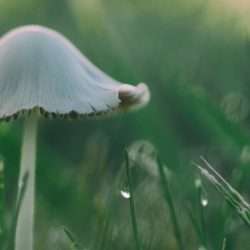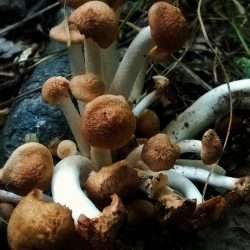Listen to this episode on iTunes | Spotify | Pocket Casts | Overcast
Video Below
 Dr. Mikael Palner is an associate professor in the Department of Clinical Research at the University of Southern Denmark, studying the biological correlates of maladaptive neuropsychiatric diseases—such as anxiety, obsessive-compulsive disorder, post-traumatic stress syndrome—as well as the pharmacological and biological effects of novel treatment options.
Dr. Mikael Palner is an associate professor in the Department of Clinical Research at the University of Southern Denmark, studying the biological correlates of maladaptive neuropsychiatric diseases—such as anxiety, obsessive-compulsive disorder, post-traumatic stress syndrome—as well as the pharmacological and biological effects of novel treatment options.
One of those novel treatment options he has studying is microdosing psilocybin. In particular to this episode, we explore his research in administering chronic, low doses (microdoses) of psilocybin to rats to study its effects of stress induced anhedonia (a model of depression) as well as compulsive behaviours.
His results offer insight into what may be a biological mechanism behind stress resiliency effects of psilocybin microdosing. In Palner’s words,
The present results substantiate many anecdotal and self-reported claims from psychedelic microdosing in recent years …. These results may indicate a therapeutic potential of repeated low doses of psilocybin in cases where approach and avoidance motivations are in conflict. [source]
In other words, that psilocybin microdosing may help people manage the conflict between the positive life health choices we want to make and the compulsions towards the choices we are trying to change.
In this episode we are going to explore Palner’s research on the positive effects of microdosing psilocybin on stress resiliency, compulsions, and neuroplasticity; as well as what microdosing IS NOT good for, and some important cautions to consider with respect to potential harms of microdosing.
We also discuss why studies in rats show clear biological effects of microdosing on behaviour, but human studies seem to suggest placebo; a neural level definition of psychedelic microdosing; why microdosing research is being polluted by a lack of specificity; the value of the “psychedelic” effect of psychedelics in their use as a medicine; and why what rats need higher doses of psychedelics than human by weight.
Enjoy!
Follow Palner on LinedIn
***See below for a complete topic breakdown.***
Watch In Video
♥ SUBSCRIBE TO THE PODCAST ♥
ITUNES | RSS | STITCHER | TUNEIN | GOOGLE PLAY | YOUTUBE | YOUTUBE (EPISODE CLIPS) | SPOTIFY | AMAZON
STAY INFORMED
EMAIL NEWSLETTER | TELEGRAM CHANNEL | ATTMIND PODCAST SUBREDDIT
Episode Breakdown
- (00:00) Opening
- (05:02) Interview begins
- (05:08) Psychedelic microdosing (vs low doses)
- (06:44) The scientific study of psychedelic microdosing
- (08:43) A neural level definition of psychedelic microdosing
- (10:36) An explanation of receptor site binder occupancy and how it relates to microdosing vs macrodosing
- (16:27) Why the whole mushroom is more potent than equivalent psilocybin in extracted form
- (17:22) Rats need more drugs by weight than humans to get high
- (19:40) The models Palner used to study low dose psilocybin’s effect on stress
- (26:27) The results of their study on low dose psilocybin, anhedonia
- (28:53) The stress-buffering effects were on the day after the psilocybin
- (32:01) psilocybin microdosing increases stress resilience, lowering compulsion pressure
- (34:37) Explaining conflict between approach and avoidance motivations (compulsion), and how psilocybin may help
- (39:26) 5-HT7 receptor, the paraventricular thalamic nucleus, and compulsive behaviour
- (42:10) Microdosing psilocybin, placebo or no?
- (44:22) Debating the value of removing the psychedelic effect from psychedelic drugs
- (50:39) Why human research suggestion microdosing benefits are placebo, while animal studies show biological cause and effect
- (55:50) Patreon thanks and info
- (58:28) Psilocybin Microdosing, what the science says it is and isn’t likely to help with
- (1:00:53) psilocybin microdosing DO NOT make you more productive or creative, science says
- (1:03:42) What science suggestion psilocybin microdosing is likely to help us with
- (1:04:45) The neuroplasticity from psilocybin microdoses may harm an otherwise healthy person
- (1:08:52) microdosing research is being polluted by a lack of specificity
- (1:15:05) The 2024 FDA denial of MDMA was a good thing for psychedelic science
- (1:16:09) What research is next for Palner
- (1:17:49) How to stay connected with Palner’s work
- (1:18:51) Closing
- (1:19:50) Integration coaching
Please SUPPORT THE PODCAST
OFFER WHAT YOU CAN IN A ONE-TIME PAYPAL OR BITCOIN DONATION, OR you can BECOME MY PATRON ON PATREON.
No amount is too small; anything is something.
You can also buy one of my books or an ATTMind TeeShirt
Or share this post via social media or simply tell a friend about it.
*** Extra BIG thanks to my patrons on Patreon! Especially my $23+ patrons, Andreas D, Ian C, Alex F, Eliz C







